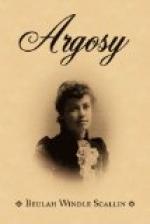Paul seemed to me, in looks at least, to have more than fulfilled the promise of his boyhood. A handsomer, more self-reliant-looking young fellow I had never seen; and I was not long in the house before I observed—with secret tears of amusement—that it was not only in looks he remained unchanged. The same dictatorialness and sharp tongue; the same thinly-veiled insolence to Duncan; the same swift smiles from his entrancing lips—thank Heaven undisfigured by any moustache—to myself; the same unalterable gentleness to Janet. His invariable courtesy to Duncan’s wife made me very happy. It was as I said: there was much good in the boy.
Paul had a little money of his own to begin with, and I did think Duncan, with his fortune, might have sent an exceptionally clever lad like that to one of the Universities, and made something of him afterwards—a lawyer, say; but instead of that, Paul was put into business in London, and, I was glad to hear, was doing very well.
As for Duncan’s hideous white brick castle, with its paltry half-dozen acres, entered by lodges of the utmost pretension, and his coach-houses full of flashy carriages, with the family coat-of-arms(!) upon each, I thought the whole place one of the most contemptible patches of snobbery on this fair earth; and I was glad my father’s toil-bleared eyes were hid in the grave, so that they should not have the shame of resting upon it.
In spite of what I thought, however, I did my best to keep a solemn face at Paul’s smart speeches, which were often amusing, and often simply impudence.
Duncan, as of yore, went as though he saw him not.
I had not been at Duncan’s palace long before I came to the conclusion that there was some private understanding betwixt the two young people; and, at last, just before I left, my suspicions were confirmed.
Hastily pushing open the library door, which stood ajar, I saw Paul with his back to me, at the end of the room, looking into the conservatory. He had evidently just entered from the garden. “Janet,” he called, in a voice the import of which there could be no mistaking; and with a rush, I heard several pots crash; Janet, who had no doubt happened to have her head turned the other way, sprang into view, and threw herself into his arms.
I quietly withdrew, and went away very, very happy. I knew Paul had a promise of a first-rate appointment abroad, by-and-by; and supposing I should hear more of this before long, I went placidly away home to the far north. Instead of that, in six months or so, Janet wrote announcing her engagement to the Honourable Stephen Vandeleur.
Of course I went south for Janet’s wedding.
If I had thought she was being forced into this marriage (Duncan was snob enough) I should not have gone a step, but should have done my best to prevent it; but I could not think that from the tone of the letter; and Paul wrote as well all about it. I could but think I had been mistaken; that there had been no serious engagement between them, but only a flirtation, as they might call it, or something of that sort: a very reprehensible flirtation, with my Puritanical notions, it seemed to me. I need not say I was greatly disappointed.




